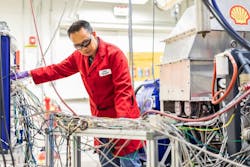COVID-19 oozed into every part of our lives this past year and that includes the engines in our cars. Americans have driven less during the past 12 months, but that doesn’t mean oil changes should be happening any less frequently.
Take the lady who called into the Pennzoil hotline recently, asking about when to get an oil change.
She said she doesn’t get out much, but wondered if she should change her car’s oil anyway, since she never had. When the hotline specialist asked how long she had owned the car, she responded, “Six years.”
Pandemic or not, this is not normal. Vehicle owners need to be aware that time intervals — rather than mileage intervals — might be a bigger factor in oil changes, especially this year.
Evolving technology
The American Petroleum Institute (API) unveiled new oil standards in 2020. Seven years in the making, the new oils are called ILSAC GF-6A, ILSAC GF-6B and API SP. They replace the ILSAC GF-5 and API SN standards.
“The data that we ask these oil marketers to provide to us is extensive,” says Jeff Harmening, team leader at API.
Original equipment vehicle manufacturers requested upgrades in engine oil quality to deal with some issues of the modern engine, including the low speed pre-ignition (LSP) phenomenon, in which fuel is injected directly into the combustion chamber of turbocharger-equipped cars.
“In the name of lower carbon dioxide emissions, automakers have gone into downsizing (engines),” says Kyle Kress, director of OEM products for Phillips 66 Co. “So when you combine fuel injection with turbochargers, LSP was observed.”
Sean Nguyen, Pennzoil scientist and technology specialist, says that API “incorporated a lot of new tasks and more stringent methodologies to assist in fuel economy, assist in emissions control and assist in better wear protection and oxidation resistance.”
One dealer's approach
Tire dealers who provide oil changes are staying current with upgrades in oil technology.
However, Shane Wilks, president of Wilks Tire & Battery Service in Albertville, Ala., says these changes have not really impacted how his company deals with customers.
In fact, he sees oil changes as business as usual.
Wilks Tire has observed “no changes that would impact customers,” says Wilks. “We don’t do special days or oil change pricing. We tend to try to provide superior service day in and day out to keep our customer base coming to us. We are less expensive than the typical quick oil change places in our area.”
Wilks says his company does not “try to play the quick oil change game. We try to hire and have people doing oil changes who aren’t just low-end, general service guys. The guys who we typically try to get to do oil changes are more experienced.”
Wilks Tire & Battery Service continues to grow as it starts construction on another retail location to go with the four it has now. The dealership, which employs 110 people, has a couple of hybrid stores that sell both consumer and retail tires and three more locations that are just commercial.
The company also is building a new corporate office, adding on to its retread plant and putting on an addition at its distribution center.
‘The new normal'
During the first three quarters of 2020, there was a large reduction in miles driven in the U.S., says Pennzoil’s Nguyen.
Education - even in the case of customers who are driving less - is key when discussing new engine oil technologies, he explains.
“We have recognized that people aren’t driving as much,” he says. “This is the new normal.
“How to educate consumers that mileage is not just an interval, but that time is a huge factor, especially with the short, irregular driving” should be factored in.
And according to both Kress and Nguyen, car owners are keeping their vehicles longer now — closer to 12 years, in some cases.
As for the future of oil technologies, Harmening thinks the industry is in a good place.
“These specs and the oils designed to meet those specs are going to carry us for the next handful of years, until engine design changes again. That has been the catalyst for all of our new categories."
About the Author

Ron Ledgard
Managing Editor
Ron Ledgard is the managing editor for Modern Tire Dealer and Auto Service Professional. He previously worked for The Athletic, the Akron Beacon Journal and DK Pittsburgh Sports. He started at MTD and ASP in January of 2021. He is a graduate of the University of Pittsburgh. #H2P He enjoys the outdoors, sports, cooking (or, at least, eating food) and running (but that is a work in progress).
